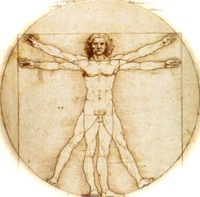Difference between revisions of "Humanism"
m (Text replacement - "http://" to "https://") |
|||
| Line 1: | Line 1: | ||
[[File:lighterstill.jpg]][[File:Vitruvian_man_2.jpg|right]] | [[File:lighterstill.jpg]][[File:Vitruvian_man_2.jpg|right]] | ||
| − | *[ | + | *[https://en.wikipedia.org/wiki/19th_century 1832] |
==Definitions== | ==Definitions== | ||
*1a : [[devotion]] to the [[humanities]] : literary [[culture]] | *1a : [[devotion]] to the [[humanities]] : literary [[culture]] | ||
| Line 10: | Line 10: | ||
'''Humanism''' is an approach in [[study]], [[philosophy]], or [[practice]] that [[focuses]] on [[human]] [[values]] and concerns. The term can mean several things, for example: | '''Humanism''' is an approach in [[study]], [[philosophy]], or [[practice]] that [[focuses]] on [[human]] [[values]] and concerns. The term can mean several things, for example: | ||
| − | *1. A historical [[movement]] associated especially with the [ | + | *1. A historical [[movement]] associated especially with the [https://en.wikipedia.org/wiki/Italian_Renaissance Italian Renaissance]. |
*2. An approach to [[education]] that uses literary means or a focus on the [[humanities]] to inform [[students]]. | *2. An approach to [[education]] that uses literary means or a focus on the [[humanities]] to inform [[students]]. | ||
*3. A variety of [[perspectives]] in [[philosophy]] and [[social science]] which affirm some notion of 'human nature' (by contrast with anti-humanism). | *3. A variety of [[perspectives]] in [[philosophy]] and [[social science]] which affirm some notion of 'human nature' (by contrast with anti-humanism). | ||
*4. A [[secular]] [[ideology]] which espouses [[reason]], [[ethics]], and [[justice]], whilst specifically rejecting [[supernatural]] and religious [[dogma]] as a basis of [[morality]] and [[decision]]-making. | *4. A [[secular]] [[ideology]] which espouses [[reason]], [[ethics]], and [[justice]], whilst specifically rejecting [[supernatural]] and religious [[dogma]] as a basis of [[morality]] and [[decision]]-making. | ||
| − | The latter [[interpretation]] may be attributed to [ | + | The latter [[interpretation]] may be attributed to [https://en.wikipedia.org/wiki/Secular_humanism Secular Humanism] as a specific humanistic life stance. [[Modern]] [[meanings]] of the word have therefore come to be associated with a rejection of appeals to the [[supernatural]] or to some higher [[authority]]. This [[interpretation]] may be directly contrasted with other prominent uses of the term in [[traditional]] religious circles. Humanism of this strand arose from a trajectory extending from the [https://en.wikipedia.org/wiki/Deism deism] and [https://en.wikipedia.org/wiki/Anti-clericalism anti-clericalism] of the [https://en.wikipedia.org/wiki/Age_of_Enlightenment Enlightenment], the various secular movements of the 19th century (such as [https://en.wikipedia.org/wiki/Positivism positivism]), and the overarching expansion of the scientific project.[https://en.wikipedia.org/wiki/Humanism] |
[[Category: Philosophy]] | [[Category: Philosophy]] | ||
Latest revision as of 23:56, 12 December 2020
Definitions
- 1a : devotion to the humanities : literary culture
- b : the revival of classical letters, individualistic and critical spirit, and emphasis on secular concerns characteristic of the Renaissance
- 2: humanitarianism
- 3: a doctrine, attitude, or way of life centered on human interests or values; especially : a philosophy that usually rejects supernaturalism and stresses an individual's dignity and worth and capacity for self-realization through reason
Description
Humanism is an approach in study, philosophy, or practice that focuses on human values and concerns. The term can mean several things, for example:
- 1. A historical movement associated especially with the Italian Renaissance.
- 2. An approach to education that uses literary means or a focus on the humanities to inform students.
- 3. A variety of perspectives in philosophy and social science which affirm some notion of 'human nature' (by contrast with anti-humanism).
- 4. A secular ideology which espouses reason, ethics, and justice, whilst specifically rejecting supernatural and religious dogma as a basis of morality and decision-making.
The latter interpretation may be attributed to Secular Humanism as a specific humanistic life stance. Modern meanings of the word have therefore come to be associated with a rejection of appeals to the supernatural or to some higher authority. This interpretation may be directly contrasted with other prominent uses of the term in traditional religious circles. Humanism of this strand arose from a trajectory extending from the deism and anti-clericalism of the Enlightenment, the various secular movements of the 19th century (such as positivism), and the overarching expansion of the scientific project.[1]
